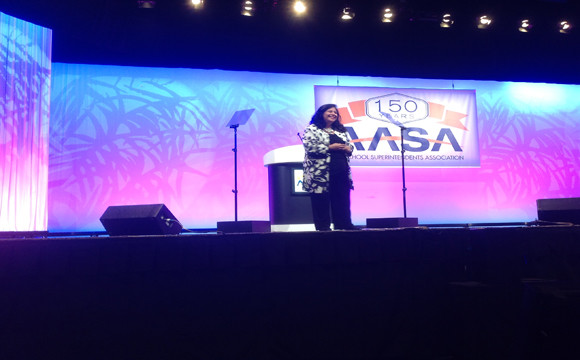What can teachers do to embrace cultural diversity?

Many culturally diverse U.S. citizens have faced adverse circumstances to obtain a quality education. It is those special teachers who have embraced cultural diversity that have made the difference in the lives of their students to help them succeed. Considering the continued diversity of the US population, the critical question is: What can teachers do to embrace cultural diversity?
This special feature provides an excerpt of Lt. Colonel Consuelo Kickbusch’s presentation at the 2015 National Conference on Education in San Diego, Calif. Kickbusch’s message challenged educators to become more culturally competent and develop learning environments that embrace the diversity of our nation.
Kickbusch was born and raised along the border in a small barrio in Laredo, Texas. As a child, she faced poverty, discrimination and illiteracy challenges. Despite being raised without material wealth, Kickbusch’s immigrant parents instilled in her that she was rich in faith, values and culture. Kickbusch graduated from Hardin Simmons University, served in the U.S. Army for 20 years and became the highest-ranking Hispanic woman in the Combat Support Field of the U.S. Army. Before her mother’s death, she encouraged Kickbusch to return home and become a community leader.
Kickbusch said that her educational experience at the elementary and middle school levels did not prepare her for a promising future because the teachers lacked cultural awareness, diversity and support. It was not until she met her high school teacher, Mr. Cooper, that anyone took a vested interest in her future and helped her to overcome inequality and illiteracy.
According to Kickbusch, Mr. Cooper told her that “she was brilliant and a leader but was leading in the wrong way.” Being an extraordinary teacher, Mr. Cooper visited her home while in high school and met with her parents and spoke to them in their native language. Cooper told Kickbusch’s parents that he wanted the best for their daughter and was going to make sure she went to college. He helped Kickbusch apply and get accepted to college. He also changed her behavior and other people’s perceptions about her. Mr. Cooper disallowed Kickbusch’s low test scores for college to decide her future and inculcated in her that she was ‘the American Dream.’
Kickbusch closed her compelling speech about her life by encouraging educators to look beyond children’s skin color and treat them all the same. Kickbusch admonished teachers to, “Stay in the field of education and don’t give up on children. Let’s tell the true story of democracy. Let’s spend time commercializing the value of education through television in lieu of ads that are meaningless to our children’s future. I know there are thousands of Mr. Coopers in the world. Let’s appreciate and learn to accept cultural differences in all walks of life: school, work and community.”
Dr. Ronald Holmes is the author of eight books, “Education Questions to be Answered,” “Current Issues and Answers in Education,” “How to Eradicate Hazing,” “Professional Career Paths” “Your Answers to Education Questions,” “How to Revitalize the National Baptist Convention, USA, Inc.” “Completing the Dissertation: Tips, techniques and real-life experiences from Ph.D. graduates” and “Jacob’s Dream, A Story of Careers for Children.” He is the publisher of “The Holmes Education Post,” an education focused Internet newspaper. Holmes is a former teacher, school administrator and district superintendent. He can be reached at [email protected]

